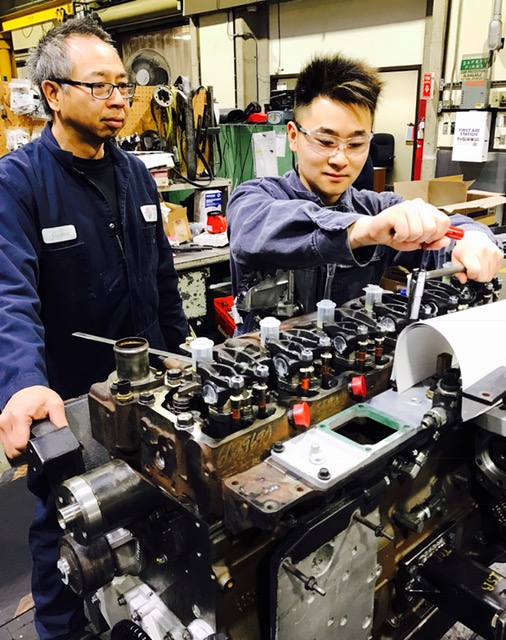
@username ♬ original sound
| Key Metric | Information |
|---|---|
| Top Salaries | $192,000/yr avg for mechanical engineers $64,200/yr avg for HVAC technicians |
| License Types | Contractor (CSLB): C-20 HVAC, General Engineering BAR: Smog Check, Mobile Mechanics |
| Training Timeline | 18 months+ apprenticeship to 5 years traditional |
| Job Growth | 15% growth for industrial machinery mechanics 13% projected growth for mechanical trades |
| Total Investment | $20,000+ including education, licensing, tools |
San Francisco's mechanical trade industry in 2025 offers lucrative opportunities for those ready to meet California's rigorous standards. With mechanical engineers earning up to $434,000/year and skilled technicians making $64,200–$82,430 annually, the economic potential is substantial. The city faces a retirement wave affecting 25% of skilled workers, creating openings in a field projected to see 13–15% growth through 2033. While the path requires significant investment—$20,000+ and 18 months to 5 years to become fully licensed—the sector remains a stable career option despite broader economic uncertainty.
 Mechanical trade professionals in San Francisco fill critical roles across multiple sectors including automotive repair, HVAC systems, industrial machinery maintenance, and aerospace manufacturing. These skilled workers design, install, repair, and maintain mechanical systems in residential, commercial, and industrial settings. With Los Angeles and Bay Area industries adopting increasingly sophisticated technology like Computer Numeric Control (CNC) machine tools, modern trade professionals need both traditional hands-on skills and technical knowledge in automation systems, digital diagnostics, and data analysis. This evolution creates opportunities for tech-savvy workers while maintaining demand for core mechanical expertise; for more on the national outlook, visit the BLS Mechanical Engineers page.
Mechanical trade professionals in San Francisco fill critical roles across multiple sectors including automotive repair, HVAC systems, industrial machinery maintenance, and aerospace manufacturing. These skilled workers design, install, repair, and maintain mechanical systems in residential, commercial, and industrial settings. With Los Angeles and Bay Area industries adopting increasingly sophisticated technology like Computer Numeric Control (CNC) machine tools, modern trade professionals need both traditional hands-on skills and technical knowledge in automation systems, digital diagnostics, and data analysis. This evolution creates opportunities for tech-savvy workers while maintaining demand for core mechanical expertise; for more on the national outlook, visit the BLS Mechanical Engineers page.
California maintains strict licensing requirements through two primary agencies:
Key license classifications relevant to San Francisco mechanics include:
Unlicensed contractors lose legal protections for payment disputes, making proper certification essential for sustainable career growth.
San Francisco offers multiple pathways for aspiring mechanical professionals:
City College Automotive Program
Skyline College Automotive Technology
Trade Schools and Apprenticeships
Recommended industry certifications:
For apprenticeship opportunities in San Francisco, Gild provides a centralized platform connecting job seekers with training programs across mechanical trades.
Follow this clear pathway to certification:
Training timelines vary based on educational choices:

| Training Option | Timeline |
|---|---|
| Certificate Programs | 6+ months |
| Vocational Training | 12–24 months |
| Apprenticeships | 4–5 years |
| Experience Substitution | 3 years education = 1 year experience credit |
| Total Pathway | 18 months (accelerated) to 5 years |
Apprenticeships provide the most comprehensive preparation by combining classroom instruction with paid on-the-job training under experienced mentors. Many programs in San Francisco, like the Apprentice Maintenance Machinist I opportunity, include structured training plans for steady professional development. For additional details on U.S. trade outlooks, check BLS Industries at a Glance.
Pursuing a mechanical trade career in San Francisco represents a substantial financial commitment:
| Expense Category | Cost Range |
|---|---|
| Education | $15,000–$34,000 |
| Licensing Fees | $780 (CSLB + bar fees) |
| Examinations | $96–$960 (varies by certifications) |
| Tools and Equipment | $1,000–$5,000 |
| Security Bonds | $500–$1,500 annual premium |
| Insurance | Variable with business structure |
Apprenticeship models help offset education costs through earned wages, while trade school graduates typically face higher upfront expenses. Consider the long-term earning potential: HVAC technicians earn $59,470–$82,430 annually, and skilled CNC Machinists can make $25–$40/hour in aerospace and medical manufacturing [source 5]. For salary benchmarks, explore ZipRecruiter's Skilled Trade Salaries.
 San Francisco's evolving industrial landscape creates strong demand for qualified mechanical professionals:
San Francisco's evolving industrial landscape creates strong demand for qualified mechanical professionals:
High-demand roles and salaries:
Industry trends shaping the market:
While economic conditions show moderate slowing with 1% job reductions in early 2025, skilled trade positions remain highly competitive due to persistent workforce shortages in mechanical specialties despite easier hiring conditions in other sectors.
While opportunity abounds, aspiring mechanical professionals must navigate several local challenges:
High Cost of Living: San Francisco maintains one of the nation's highest cost-of-living indexes, putting pressure on early-career professionals. Entry-level HVAC technicians and apprentices should research affordable housing options beyond traditional neighborhoods.
Industry Competition: Although employers face difficulties finding qualified mechanical engineers and technicians, newcomers must differentiate themselves through certifications, apprenticeship experience, and specialized training in automation and digital systems.
Economic Uncertainty: Broader San Francisco economic pressures including employment level reductions and hiring caution should encourage candidates to pursue versatile skill sets. Those with CNC machine operation, hybrid/electric vehicle repair, or automation maintenance expertise remain particularly marketable.
Licensing Hurdles: California's rigorous licensing framework requires careful planning to avoid delays. Begin exam preparation early and consider apprenticeships that include licensing mentorship. For economic reports, refer to the San Francisco Economy Status.
With clear licensing pathways established and strong earning potential in specialized roles, mechanical trade careers in San Francisco offer substantial rewards. The industry's need for technically skilled workers continues growing even through economic fluctuations, particularly for those trained in modern technologies like CNC machining, digital diagnostics, and automation systems.
Ready to begin your journey? Explore available apprenticeship programs on Gild's platform to connect with training opportunities that provide both hands-on experience and financial support during your education. Early preparation for licensing exams and careful career planning will help you navigate California's rigorous requirements and position yourself for long-term success in one of the nation's most dynamic job markets.

